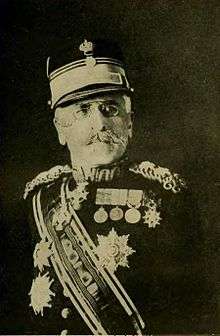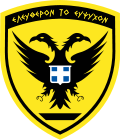Panagiotis Danglis
| Panagiotis Danglis Παναγιώτης Δαγκλής | |
|---|---|
 Panagiotis Danglis in the 1910s | |
| Born |
1853[1] Agrinio, Aetolia-Acarnania |
| Died |
9 March 1924 (aged 70–71) Athens, Greece |
| Allegiance |
|
| Service/branch | Hellenic Army |
| Years of service | 1878–1920 |
| Rank |
|
| Battles/wars |
Greco-Turkish War Balkan Wars World War I |
| Awards | Order of the Redeemer, Grand Commander |
Panagiotis Danglis (Greek: Παναγιώτης Δαγκλής; 1853 – 9 March 1924) was a Greek Army general and politician. He is particularly notable for his invention of the Schneider-Danglis mountain gun, his service as chief of staff in the Balkan Wars and his participation in the Triumvirate of the Provisional Government of National Defence during World War I.
Life
Panagiotis Danglis was born in Agrinio in 1853,[2] the son of Major General Georgios Danglis (1809–1896).
He entered the Hellenic Army Academy and graduated on 8 February 1878 top of his class, being commissioned as a Second Lieutenant of Artillery. Promoted to Lieutenant in 1880 and Captain in 1883, he went for a year in Belgium for further studies, and on his return was appointed adjutant to Brigadier Victor Vosseur, the head of the 1884–87 French military mission, which had been tasked with modernizing the Greek Army.[2] Danglis subsequently served in an artillery regiment and taught at the Army Academy as Artillery instructor. He was promoted to Major in 1892, and in the next year invented the Schneider-Danglis mountain gun.[2] During the Greco-Turkish War of 1897 he served as chief of staff of I Brigade in the Army of Epirus, and fought at the Battle of Gribovo.[2]
A Lieutenant Colonel since 1902, he was transferred to the newly founded General Staff Corps in 1904. Promoted to Colonel in 1907, he participated in the last stages of the Macedonian Struggle in 1908, supervising operations for the "Macedonian Committee" in the Salonica area under the nom de guerre of Parmenion.[2][3] Following the 1909 Goudi coup, the General Staff Corps was disbanded and Danglis returned to the Artillery, serving as commander of the Army Academy (1910), the 1st Infantry Division, the Greek Gendarmerie, and the 2nd Infantry Division (1911).
In 1911, Danglis was promoted to Major General, and became head of the Army General Staff in August 1912, and on the outbreak of the First Balkan War two months later he became chief of staff to Crown Prince Constantine's Army of Thessaly until November 1912, when he became a member of the Greek delegation in the London Peace Conference.[2] In March 1913 he was placed in command of Epirus Army Corps, and later promoted to Lieutenant General.[2]
In late 1914, he left the army and went into politics, joining the Liberal Party of Eleftherios Venizelos in 1915 and elected as an MP for Epirus representing Ioannina.[2][4] He served as Minister for Military Affairs in Venizelos' short-lived cabinet (10 August – 24 September) in 1915,[5] and supported Venizelos during his struggle against King Constantine in 1915–16. In August 1916, along with Venizelos and admiral Pavlos Kountouriotis, he formed the leading triumvirate of the "Provisional Government of National Defence", a separate government in Thessaloniki.[2] In 1917, Greece formally joined the Entente Powers in the First World War. Danglis was appointed nominal commander-in-chief of the Greek Army, a position he retained until near the war's end, when he returned to his parliamentary office. He was formally discharged from the Army on 7 October 1920.[2] In 1921, Danglis succeeded the self-exiled Venizelos as president of the Liberal Party.
He died in Athens on 9 March 1924.
Sources
| Wikimedia Commons has media related to Panagiotis Danglis. |
- ↑ Note: Greece officially adopted the Gregorian calendar on 16 February 1923 (which became 1 March). All dates prior to that, unless specifically denoted, are Old Style.
- 1 2 3 4 5 6 7 8 9 10 "Αντιστράτηγος ΔΑΓΚΛΗΣ ΠΑΝΑΓΙΩΤΗΣ του ΓΕΩΡΓΙΟΥ, ΑΜ 1336.". Συνοπτική Ιστορία του Γενικού Επιτελείου Στρατού 1901–2001 [A Concise History of the Hellenic Army General Staff 1901–2001] (in Greek). Athens: Army History Directorate. 2001. p. 136.
- ↑ Veremēs, Thanos (1997). The military in Greek politics: from independence to democracy. Hurst & Company. p. 197.
- ↑ Vatikiotis, Panayiotis J. (1998). Popular autocracy in Greece, 1936-41: a political biography of general Ioannis Metaxas. Frank Cass. p. 67. ISBN 978-0-7146-4869-9. Retrieved 13 December 2011.
- ↑ Κυβέρνησις ΕΛΕΥΘΕΡΙΟΥ ΒΕΝΙΖΕΛΟΥ - Από 10.8.1915 έως 24.9.1915 (in Greek). General Secretariat of the Government. Retrieved 21 March 2014.
| Political offices | ||
|---|---|---|
| Preceded by Dimitrios Gounaris |
Minister for Military Affairs 10 August – 24 September 1915 |
Succeeded by Ioannis Giannakitsas |
| Military offices | ||
| Vacant Abolition of the General Staff in 1909 Title last held by Konstantinos Sapountzakis |
Chief of the Army Staff Service August 1912 – March 1913 |
Succeeded by Viktor Dousmanis |
| New title | Commander-in-chief of the Greek Army May – October 1918 |
Succeeded by Lt. General Leonidas Paraskevopoulos |
